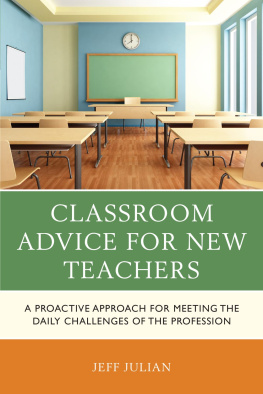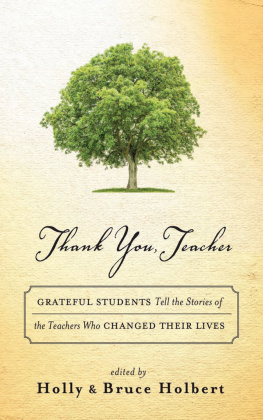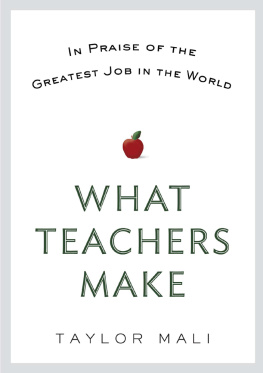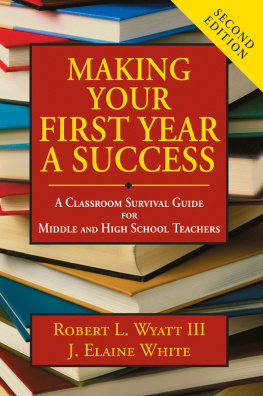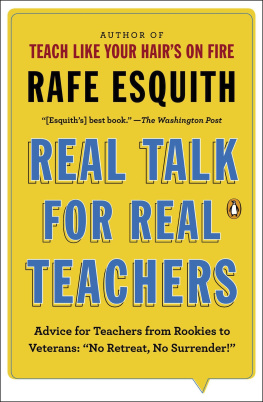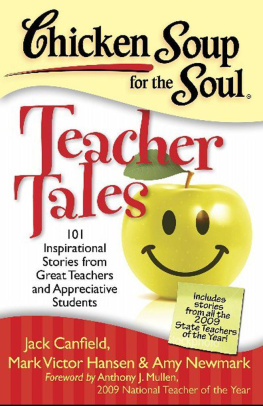2. The Ten Things You Will
Wish Someone Had Told You
4. Maintaining and Regaining Your Sanity,
One Month at a Time
5. Piles and Files:
Organization and Time Management
9. The Due-Date Blues:
When High Expectations Meet Low Motivation
10. No Child Left Yeah, Yeah, You Know:
Different Types of Students and
What Each Type Needs from You
12. The Teachers Lounge: Making It Work
with the People You Work With
19. Dos and Donts for Helping New Teachers
in Your School
1
What This Book Is
and Is Not
S ome teachers are naturals from the first day. They instinctively motivate students, set high expectations, and managenot disciplinetheir classes. They stay positive and organized, tracking progress in binders of color-coded data and planning lessons that address each childs unique learning modality. These teachers dont just teachthey inspire! They spring out of bed each morning knowing materials are laid out, papers are graded, and their classrooms are welcoming environments where all students can succeed. This book is not for them.
This book is for anyone who wishes those teachers would stop telling you how organized they are while you stare at a growing stack of ungraded essays. Its for those of you who are sleeping less than ever before, raising your voices louder than you ever imagined you would, and wondering why kids take sooooo long in the bathroom and often come out covered in water. This is for any new teacher wondering whether to get out of bed at all.
Read this when a lesson goes horribly wrong, when your whole class forgets a major project, or when a parent curses at you in front of the kids. Pull it out at lunch on a bad day or on Sunday night as you battle those six-more-hours-till-Monday stomach cramps. This is meant to get you to school tomorrow.
But first, a few warnings
This Book Is Not Professional Development
N o book can replace the difficult, necessary process of learning to teach. Read this after you have attended more than enough workshops, received so many lists of recommended books you get tired from reading the lists, and gotten plenty of advice about time-consuming things you could do to be a better teacher. Im assuming youve heard the terms benchmark, classroom management, and data-driven instruction. You also know which of these describes what you were doing wrong when your principal walked in.
You may even be enrolled in a certification program, where you spend some of the longest hours of your life watching PowerPoint presentations on the importance of hands-on lessons, taking multiple-choice practice tests, and praying this isnt how your students feel while youre teaching.
This book is meant to keep you from getting discouraged when it seems like all those fabulous ideas you learned in training dont work in your own classroom: no one understands the directions, and it turns out you had no business giving those kids glue in the first place, and it also turns out the National Geographic magazines you found cheap and felt great about became a gallery of nude pictures for your sixth-graders. Its also for the next day, when parents show up to complaineven though their kids are downloading much more graphic pictures on their home computers and bringing them to school which is why their printers ran out of ink which is why their projects arent finished.
You, on the other hand, still have to prepare that sample hands-on lesson plan for your training class tonight.
This Book Is Not Chicken Soup
for the Teachers Soul
I ts more like Hard Liquor for the Teachers Soulnew teachers need something stronger than chicken soup. Read this on the days when any book by a teacher who taught kids to play violin during lunch or took busloads of perfectly behaved fifth-graders on a tour of college campuses makes you want to beat your head against the wall until pieces of scalp and hair are all over the place.
The basis for this book is an idea that worked for me: teachers willing to admit their mistakes are much more helpful to rookies than those who say, Well, they would know better than to do that in my class. The stories in this book should be bad enough to make you feel better.
The real reason to feel better, though, is that all the people who shared their stories in this book went on to become successful, experienced teachers. Theyre not administrators (who, dont get me wrong, do important jobs). Theyre not counselors (who also do important jobs). Theyre not presenters or auditors from a downtown office (who do jobs).
They are teachers. In classrooms. And they love itmost days.
This Book Is Not Teaching for Dummies
D ummies shouldnt be teachers. As a country, we need educators who have brains, dedication, enthusiasm, and common sense. We need people who want to change things in the schools where things most need to change.
But we need you to stay at your jobs, and stay sane.
Acting like a hard job can be done easily is a sure way to do it wrong. The knowledge teachers need is complicated, its important, and its way more than anyone can learn in one year. The great teachers of the future know theyre not great yet. They know theyre making mistakes, and some of those mistakes are big. Theyre sorting through a million pieces of advice, each starting with the words All you have to do is , until they want to lie on their backs in the school hallway and yell, This is all the time and energy I have! Can someone please tell me what I should really spend it on?
If you can relate to the preceding paragraph, you were my inspiration. And this book is for you.
2
The Ten Things You
Will Wish Someone
Had Told You
If someone had told me everything I needed to know before I started teaching, it wouldnt have mattered. I wouldnt have listened anyway. I was better and knew more than anyone. I was exactly the kind of new teacher Id like to help. Talk about ironywouldnt have listened to myself even after I had been through the school of hard knocks. Still, maybe other new teachers arent as stubborn and hardheaded as I was.
16-year teacher
D ont misunderstand. We need to be stubborn. If youve watched any movies about inspiring teachers, you know part of our job description is making the impossible possibleand thats just before lunch.
But then we need to line up the class for lunch, and someone in back keeps pushing, which makes other kids whine, and you cant tell whos talking in the front, but one of his or her friends just started kicking the door, and the noise level keeps going up until, THERE IS NO WAY WE ARE LEAVING THIS CLASSROOM UNTIL YOU CAN LINE UP THE RIGHT WAY! Hey. That wasnt in the script.
Its important to set the bar high in education, but as a new teacher, I was desperate for someone to break the stay positive code and say, Yes, this happens in my classroom, too. There are no easy answers, but heres how I deal with it. I was waiting for others to admit they had doubted their own abilities, made their own mistakes. I am still waiting to see an inspiring teacher movie in which the teacher actually grades papers.



